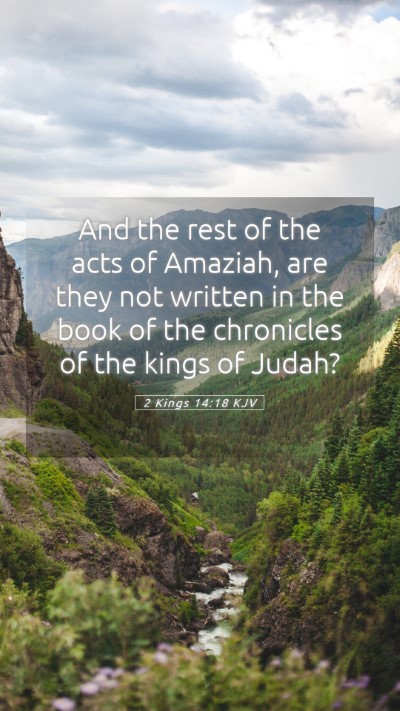This verse reads: "And the rest of the acts of Jeroboam, and all that he did, and his might, how he warred, and how he recovered Damascis and Hamath, which belonged to Judah, are they not written in the book of the chronicles of the kings of Israel?"
Meaning and Interpretation
The verse serves as a concluding statement about King Jeroboam II of Israel, highlighting his military achievements and the political dynamics of his reign. This provides an opportunity for Bible verse understanding by reflecting on the significance of historical context within Scripture.
Insights from Public Domain Commentaries
- Matthew Henry:
Henry emphasizes the achievements of Jeroboam II, putting them in the context of Israel's tumultuous history. He notes that Jeroboam's reign is marked by successful military campaigns, which not only restored territories lost to Judah but also strengthened Israel's position among surrounding nations.
- Albert Barnes:
Barnes discusses the implications of recovering territories, indicating that this signifies God allowing Jeroboam to restore Israel’s prominence. He reflects on how Jeroboam II's successes can be seen as a paradox, given the corruption and idolatry present in Israel during his time.
- Adam Clarke:
Clarke provides a detailed analysis of the historical significance, highlighting Jeroboam’s expansionist policies and their effects on the socio-political landscape of the ancient Near East. He also suggests that the mention of chronicles implies a wealth of history that God has preserved, yet much remains unwritten.
Historical Context
To fully grasp the meaning of Bible verses like this one, it is crucial to consider the historical context:
- The period of the divided monarchy in Israel.
- The geopolitical struggles involving Israel and Judah, alongside neighboring nations.
- The role of Assyria and other empires during Jeroboam II's reign.
Biblical Exegesis
Analyzing this verse showcases the importance of military power in the ancient world, reflecting on how God’s favor was often associated with such achievements. This verse encourages readers to explore Bible study insights that connect physical victories with spiritual realities.
Applications to Daily Life
This passage invites us to reflect on how power and success can manifest in our lives, often leading to questions on morality and integrity. As we examine Bible verse explanations, we are prompted to consider how our actions align with God's will, particularly when pursuing success.
Connection to Other Scriptures
This verse connects with several key passages that enhance its understanding:
- 2 Kings 13:5: where similar themes of God's deliverance through kings are explored.
- Amos 6:13: which critiques Israel's misplaced trust in military strength.
- Hosea 1:4-5: focusing on the judgment of Jeroboam's lineage.
Conclusion
Through careful Bible verse commentary and scripture analysis, we see that 2 Kings 14:18 not only documents a historical period but also serves as an invitation to dive deeper into contemporary reflections on power, morality, and our relationship with God.
Further Study and Reflection
For those interested in Bible study groups or online Bible study, this passage could lead to fruitful discussions on how contemporary leaders can learn from biblical figures like Jeroboam II. Utilizing Bible study tools and Bible study resources can deepen one's engagement with the text and enhance understanding of such critical verses.


